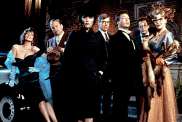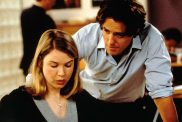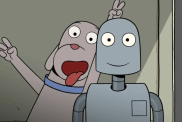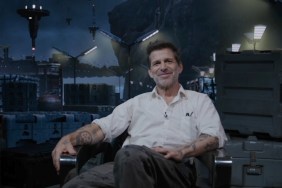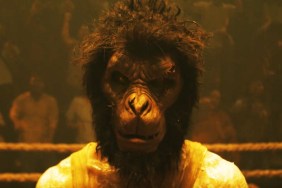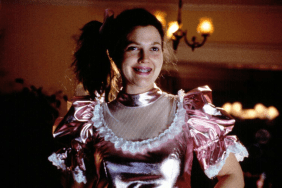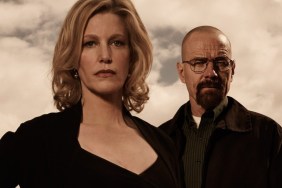
After a hiatus from acting, Ms. Crampton (seen in last year’s You’re Next) has returned with a vengeance, taking on her most wicked role to date, the woman known as Mother. Naturally, we wanted to know more, and she was kind enough to sit and give us all a window into the madness of The Divine Tragedies.
The film, based loosely on the famous Leopold and Loeb murder case, tells the tale of Charles Brubaker (Graham Denman) and his half-brother Thomas Lo Bianco (Jon Kondelik), who concoct a deadly game to test their superior intelligence against the dimwitted masses. This game will eventually lead to murder, and when Genevieve, a beautiful single mother, enters their lives they finally find the perfect girl for their first kill. But problems arise when they quickly discover that Detective Homer Gaul (Ken Foree), a cop with a very special gift, is hot on their trail.
Christopher Jimenez: Tell me about Mother…
Barbara Crampton: Mother is just that. The mother has two sons that are not very nice boys. The movie is based on the Leopold and Loeb case. These sons decide that they are going to go out and kill someone together for the intellectual experience. You see a little bit of their home life. Their mother is bed-ridden. She has terrible rheumatoid arthritis in her hands, she’s an alcoholic, she doesn’t really eat very much, and she mostly drinks all the time. At first you feel sorry for her. She needs a lot of caretaking by the boys, but as you go on you see that maybe mother isn’t to be sympathized with. There is another side of her that comes out. Meaning maybe she’s not quite as nice as nice as you think she is.
Jimenez: How did you get on this project?
Crampton: Jon Kondelik, who is producing the film and also plays one of the brothers, had seen You’re Next and thought, “How about Barbara Crampton?” which surprised me because [mother] isn’t so nice and I’m not used to playing bad characters. So, initially when I read the character I felt that it would be hard for me. This was going to be a stretch. Because she isn’t nice as we learn. I was definitely afraid to do that. And also because she was kind of repulsive I was repulsed by her. I questioned how I could play a character that I really didn’t like very much. But it’s a challenge and I can’t say no just because I’m afraid, so I sat with it for a few weeks while I was off doing another movie and I thought that I really should do this movie. It would be a good experience and I really liked the script, his writing is beautiful, very poetic and very dark. I’m really glad I did because I’ve had a wonderful time.
Jimenez: What was your most difficult scene to shoot?
Crampton: My last scene for me in the movie where really see her true colors, what she is all about, and how she really feels about one son in particular. She doesn’t say some very nice things and you realize how dark her heart is. That was a really interesting, challenging, and ultimately fun scene for me to do and I’m glad it’s over, just because it was one that I was really working on so hard. This was a very challenging scene for me to do.
Jimenez: Did you use any particular research for her?
Crampton: I watched a lot of bad mothers in other movies and I put together a compilation of a few people. I didn’t really use Joan Crawford because I felt that she was a little too over the top, but there was one movie that she did where she plays a crazy woman that murders her husband called Straitjacket. I used a little bit of that cause mothers a little crazy. For a period of three to four weeks I just immersed myself in watching all the worst mothers in movie history, so I probably used a little bit of all of them and also, when you are working on a script, things just come to you. I also read a little bit about serial killer moms. Not that my character is a serial killer but just bad women. For instance, there is one moment that I have where I use a little bit of Shelly Winters in Bloody Momma. There’s a couple of moments that she has in that movie that I was like, “Oh, I have to use that” as an homage to her. Finally, some of it’s me, working on it and also inventing within the moment. There’s a lot of choices you can make when playing a complex character with a devious background. You can work on different aspects of the character at different times. Things would come to me and I would make a choice about a certain line reading, or a certain moment or feeling I would have. Weather I was going to say a line particularly angry, hurt, or challenging to another character. Then a day goes by and maybe you make different choices. Of course then you drive yourself crazy because you have to make a choice. How are you going to play this scene? This character is so complex that there is so many ways that I could play her. That’s where the remorse and the fear come in right before filming. Because you have to let some things go and you have to commit to some things. You’re not always sure if they’re going to work or not. So you have to trust the other actors that you’re with and also the director to tell you “that works” or “that doesn’t work.”
Jimenez: Can you watch yourself in a project after you’re done?
Crampton: I can watch myself, I’m used to it cause I did 12 years on four different soap operas. Usually the first time watching myself thought, I don’t like what I did. Then after a couple of viewings I give myself a break. “I was okay,” she says smiling and tilting her head. “…passable.” [laughs]. It’s just hard because you things that you could have done differently, or choices that you didn’t make. Actors are very hard on themselves and they have to be. We’re taught to be very open and sensitive people in order to justify why a character will do certain things. We also see things in ourselves while playing different characters that maybe we don’t like. That’s just part of acting.
Stay tuned for more on The Divine Tragedies!
